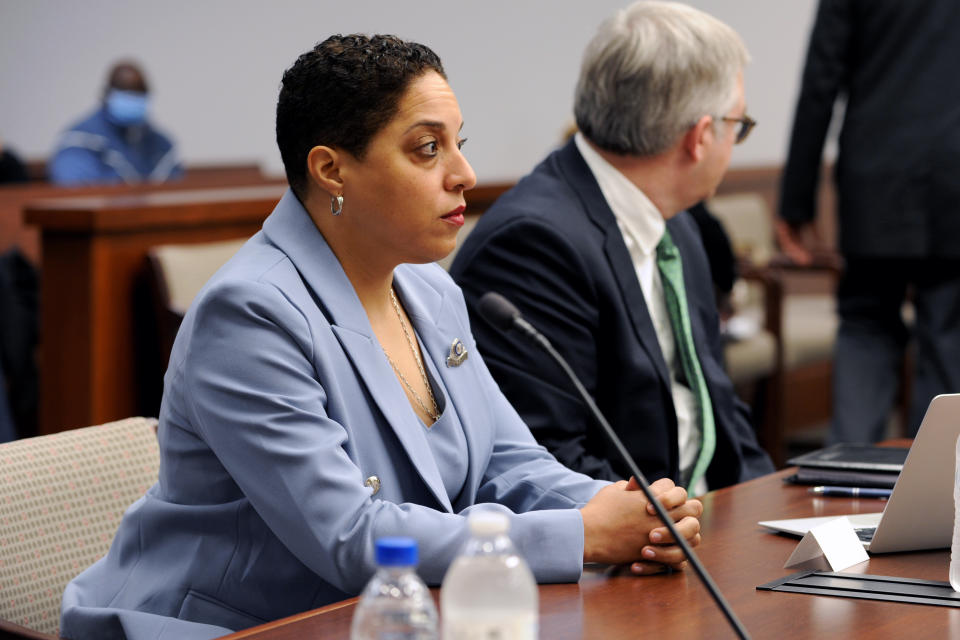Prosecutor: No evidence hiding in wrongful conviction case
ST. LOUIS (AP) — A St. Louis judge won't sanction the city's top prosecutor after Missouri's attorney general accused her of concealing evidence in her effort to overturn the conviction of Lamar Johnson, who has spent nearly three decades in prison for a murder he contends he didn't commit.
Judge David Mason ruled against the sanction request on Friday. A hearing to decide if Johnson's conviction should be vacated begins Monday and is expected to last up to five days.
Republican Attorney General Eric Schmitt asked a St. Louis judge on Thursday to sanction Circuit Attorney Kim Gardner. Johnson was sentenced to life in prison for in the death of 25-year-old Marcus Boyd in 1994, but Gardner now believes he is innocent and filed a motion in August to vacate the conviction.
At issue in the sanction request was forensic testing on a jacket seized from Johnson's trunk after his arrest. The crime lab in Kansas City, Missouri, recently determined the jacket contained gunshot residue. Schmitt accused Gardner of concealing that evidence, which Schmitt, in a court filing, called material “because it tends to prove that Johnson is guilty.”
In a response motion on Friday, Gardner said the failure to disclose the gunshot residue testing was a simple oversight — and irrelevant since the jacket in question wasn't used in the crime. Gardner said her office wasn’t even aware of the gunshot residue report until rechecking emails on Thursday, after Schmitt filed the sanction motion.
“It concerns gunshot residue testing conducted on a red-and-black Chicago Blackhawks jacket that was not even used in the crime,” Gardner’s court filing states. “In 28 years, no eyewitness has ever mentioned a red Blackhawks jacket. Considering that Boyd was shot at close range, one would also expect the jacket to be covered in blood spatter. It’s not.”
Mason's ruling said the jacket could be introduced as evidence at the hearing, but only if attorneys show that Johnson wore it when the crime was committed.
Johnson was convicted of killing Boyd over a $40 drug debt and received a life sentence. Another suspect, Phil Campbell, pleaded guilty to a reduced charge in exchange for a seven-year prison term.
Johnson claimed he was with his girlfriend miles away when Boyd was killed. Meanwhile, years after the killing, the state’s only witness recanted his identification of Johnson and Campbell as the shooters. Two other men have confessed to Boyd’s killing and said Johnson was not involved.
Gardner launched an investigation in collaboration with lawyers at the Midwest Innocence Project. She said the investigation found misconduct by a prosecutor, secret payments made to the witness, police reports that were falsified and perjured testimony.
The former prosecutor and the detective who investigated the case rejected Gardner’s allegations.
Gardner was disciplined earlier this year amid allegations of concealing evidence in another high-profile case.
In April, she reached an agreement with the Missouri Office of Disciplinary Counsel in which she acknowledged mistakes in her handling of the prosecution of former Missouri Gov. Eric Greitens. She received a written reprimand.
In that case, Gardner conceded she failed to produce documents and mistakenly maintained that all documents had been provided to Greitens’ lawyers in the 2018 criminal case that accused him of taking a compromising photo of a woman and threatening to use it if she spoke of their extramarital relationship.
The charge was eventually dropped, but Greitens resigned in June 2018.
Johnson’s claims of innocence were compelling enough to spur a state law adopted in 2021 that makes it easier for prosecutors to get new hearings in cases where there is new evidence of a wrongful conviction. The new law freed another longtime inmate last year.
Kevin Strickland was released from prison at age 62 in November 2021 after serving more than 40 years for a triple murder in Kansas City. He maintained that he wasn’t at the crime scene, and Jackson County Prosecutor Jean Peters Baker said her review convinced her that Strickland was telling the truth. A judge ordered Strickland freed.

 Yahoo Finance
Yahoo Finance 

